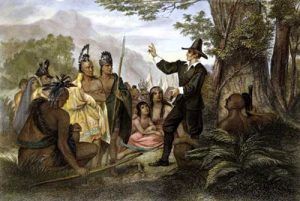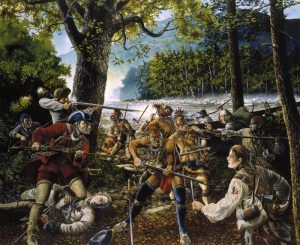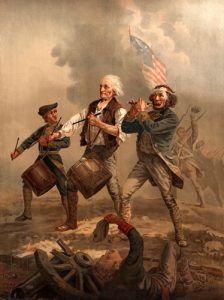
George Washington’s triumphal entry into New York City, November 25, 1783, by Edmund & Ludwig Resteing, 1879.
The Thirteen Colonies on the Atlantic coast of North America, founded in the 17th and 18th centuries, were part of Britain’s possessions in the New World.
The years 1700-1783 were very influential ones in the history of our land. From shaky beginnings, and often through great travail, the English Colonies on the mainland of North America mainly had passed through their infancy by 1700. Some were still relatively young, and the 13th colony had not yet been established, but the point of no return had long since been passed for many Englishmen-turned-Americans. Before 1775, the colonials had drifted away from dependence upon the mother country. Along with independent thought came independent actions, which, in time, produced political maturity. The English colonials became American patriots, and a new nation emerged. The transition was not sudden, as it is sometimes represented.
In the early years, the Thirteen Colonies had a high degree of self-governance and active local elections, and they resisted London’s demands for more control. The French and Indian War (1754–63) against France and its Indian allies led to growing tensions between Britain and the colonies, who, in the 1750s, began collaborating instead of dealing directly with Britain. These inter-colonial activities cultivated a sense of shared American identity and led to calls to protect the colonists’ “Rights as Englishmen.”
However, until the end of the French and Indian War in 1763, few colonists objected to their place in the British Empire. Colonists in British America reaped many benefits from the British imperial system and bore few costs for those benefits. Indeed, until the early 1760s, the primarily British left their American colonies alone. However, the French and Indian War changed everything. Although Britain eventually achieved victory over France and its allies, victory had come at a great cost. A staggering war debt influenced many British policies over the next decade. Attempts to raise money by reforming colonial administration, enforcing tax laws, and placing troops in America led directly to conflict with colonists. By the mid-1770s, relations between Americans and the British administration had become strained and acrimonious. Grievances with the British government led to the American Revolution, in which the colonies collaborated in forming the Continental Congress. The colonists fought the American Revolutionary War (1775–83) with the aid of France and, to a significantly smaller degree, the Dutch Republic and Spain.
Compiled by Kathy Alexander/Legends of America, updated January 2024.
Also See:
Sources:



